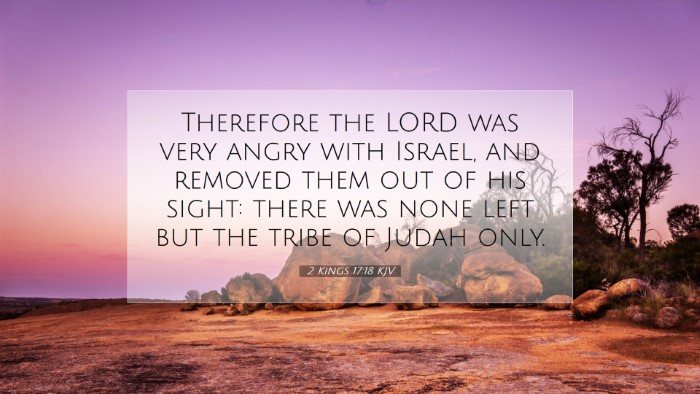Commentary on 2 Kings 17:18
Bible Verse: "Therefore the LORD was very angry with Israel and removed them out of his sight: there was none left but the tribe of Judah only."
Contextual Background
The passage is situated in a pivotal narrative concerning the decline of the northern kingdom of Israel. It marks a significant turning point as the chronicling of Israel's idolatry and rebellion against God leads to their ultimate exile.
To understand 2 Kings 17:18 thoroughly, we must consider the preceding events that shaped Israel's fate. Following the division of the united kingdom after Solomon's reign, the northern kingdom turned to idolatry, departing from the worship prescribed by Yahweh.
The Anger of the LORD
This verse opens with the strong phrase "very angry," indicating deep divine displeasure. Such anger is not arbitrary; it arises from Israel's persistent disobedience and rejection of God's covenant. According to Matthew Henry, God's anger is a response to the repeated violation of His commandments. His holiness demands justice against sin, and this divine displeasure culminates in severe consequences for His people.
Spiritual and Moral Implications
Albert Barnes emphasizes that God's anger reflects His commitment to righteousness. The notion of divine wrath is intertwined with His loving nature; He desires reconciliation but cannot overlook sin. Thus, when Israel continually turned to idols and foreign practices, God's righteous anger compelled Him to act.
The Removal from His Sight
The phrase "removed them out of his sight" signifies more than physical exile; it illustrates a severed relationship between Israel and God. Adam Clarke notes that to be cast from God's sight suggests complete abandonment from divine favor and protection, leaving the nation vulnerable to destruction.
This act of removal also fulfilled prophetic warnings given through prophets such as Hosea and Amos, who foretold the consequences of Israel's actions. The exile wasn’t merely punitive but a corrective measure intended to prompt reflection, repentance, and ultimately restoration.
Judah: The Remaining Tribe
In the latter part of the verse, we find that "there was none left but the tribe of Judah only." The singular focus on Judah underscores God's continued presence among His people, even in the wake of widespread rebellion. Matthew Henry remarks that this preservation of Judah foreshadows God's plan for redemption, as the lineage of David and, ultimately, the Messiah would emerge from this tribe.
Judah’s survival amid the calamity of Israel serves as a crucial reminder of God's covenant faithfulness. Despite Israel’s infidelity, God retains a remnant capable of returning to Him. Albert Barnes asserts that God's mercy persists even in judgment; Judah’s remaining status affords a glimmer of hope for restoration and divine favor.
Theological Significance
2 Kings 17:18 invites deep theological reflections on the nature of God’s justice and mercy. The interplay of these attributes signifies that while God is just in His judgment, He is also gracious, preserving a remnant for future redemption. This theological tension is evident throughout Scripture, culminating in the New Testament understanding of grace through Christ.
The key lessons drawn from this verse include:
- The Reality of Divine Judgment: God’s displeasure against sin leads to tangible consequences.
- The Importance of Faithfulness: The call for God's people to remain faithful amidst societal pressures and temptations.
- The Hope of Remnant Theology: Even in severe judgment, God's mercy provides a path for restoration and hope.
Conclusion
2 Kings 17:18 encapsulates the profound sorrow of God's people during a time of judgment. For pastors, students, and theologians, it serves as a powerful reminder of the consequences of straying from God while also highlighting His enduring grace. The narrative compels believers to examine their own faithfulness and encourages hope in God's redemptive plan, affirming that no matter how far a person may wander, the call to return remains open through grace.


